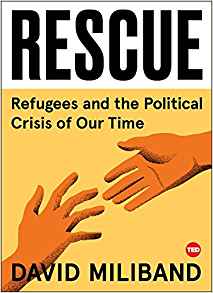 David Miliband, Rescue: Refugees and the Political Crisis of Our Time (New York: TED Books, 2017), 137pp.
David Miliband, Rescue: Refugees and the Political Crisis of Our Time (New York: TED Books, 2017), 137pp.
For about a dozen years, David Miliband was a rising star as a centrist in Britain's Labor Party, serving as both the Foreign Secretary and a Member of Parliament, among other posts. Today he is the president and CEO of the International Rescue Committee, where he's used his bully pulpit as an unapologetic, articulate, and passionate advocate for the 65 million refugees in our world that have been forcibly displaced by poverty, war, persecution, failed states and climate change.
Miliband draws upon three broad arguments in his advocacy for refugees. There's the historical legacy of post war Europe when numerous international institutions and agreements like the UNHCR, the Universal Declaration of Human Rights, and the Marshall Plan were forged to address the massive refugee crisis then. Milibrand's own Jewish parents were saved from the Nazi genocide — his father was a refugee from Belgium, and his mother was saved by hiding in a convent and then by being hidden by a Polish Catholic family. Second, there are numerous prudential arguments rooted in pragmatism. The 65 million refugees constitute huge practical problems like international security. Third, and most important in Miliband's opinion, is an argument from principle: what sort of people do we want to be, or claim to be? People of compassion and altruism who acknowledge that we have a duty to our fellow human beings, or people who turn a blind eye to the needy? So, the refugee crisis is "a test of our character, and not just our policies."
Miliband disabuses us of faulty assumptions. Most refugees live in urban areas and not in camps. More than half are under the age of eighteen. Their displacement is long term, not short term. And the vast majority of them are not in rich countries like Germany or the US, but in middle and poorer countries like Turkey or Lebanon (where refugees constitute a staggering 25% of the population).
The question of why we should help refugees is far simpler than how we should help them. Here, Miliband suggests policies and practices based upon his extensive experiences in the highest levels of government and politics, complemented by story-telling from his extensive travels for the IRC. He argues for what he calls a "dramatic redesign" of business as usual. In the end, our response to the refugee crisis "reveals whether we live up to the most basic human values." For more on this important subject, see my JwJ reviews of the three movies Kivalina (2016), Fire at Sea (2017) and Human Flow (2018) by Ai Weiwei, and the books Tears of Salt (2017) and Climate Migrants; On the Move in a Warming World (2017).


